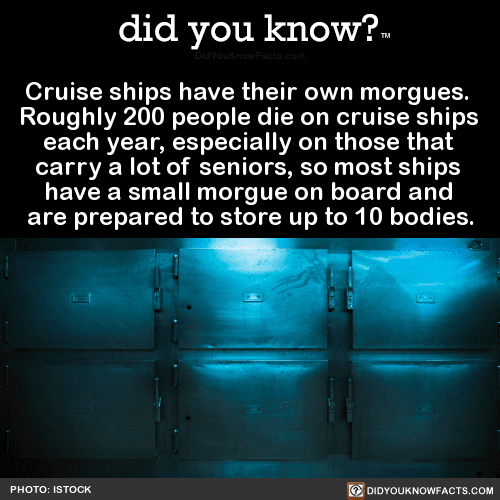Table Of Content

U.S. consulates, for instance, will help the family of the deceased in making arrangements with local authorities for preparation and disposition of the remains. They'll even serve as provisional conservator of the person's estate if no one else is able to do it. The biggest concern many loved ones face is how to bring the body home from the ship for burial.
How Do People Die on Cruise Ships?
In this article, we’ll delve into the world of cruise ship morgues and explore the procedures and options available for dealing with a passenger’s death. It’s typically estimated that 200 people a year die on cruise ships every year. However, the real figure is likely to be higher, especially if including deaths that occur at ports of call.
Mom's last words as she died from poison mushroom in sushi roll: 'I'm not sure I can go on much longer. I love you'
All cruise ships are required to have morgue facilities where a body can be stored for up to a week. Staff are required to be trained in how to handle a passenger passing away, including the appropriate storage methods for a dead body to ensure it is kept secure. The cruise ship morgue is usually a stainless steel refrigerated room where bodies can be stored. They are usually found on the ship’s lowest deck, along the ship-wide corridor known as the I-95.
Are there any religious or cultural restrictions on the handling of a deceased passenger’s body?
Cruise ships often have counselors or chaplains available to provide support and help manage the emotional impact on passengers and crew. The ship’s staff immediately notifies all passengers traveling with the same reservation as the deceased guest and alerts their emergency contact. When vacationing on a cruise ship, the last thing on most people’s minds is the possibility of death. Yet, with cruises often being the holiday choice for the older demographic, it’s estimated that around 200 people pass away annually on cruise vacations. Religious customs and cultural traditions may dictate the handling of a deceased passenger’s body.
Do Cruise Ships Have Morgues Onboard? (Why & where?)
Join her as she shares cruise insights and explores the world, one voyage at a time. Cruises may be synonymous with luxury and leisure, but it’s important to remember that tragedies can occur anywhere, even in the middle of the ocean. Guests are usually taken to a more secluded part of the ship and given privacy for scattering the remains.

Cruise ships have morgues, and body bags, and it would be a very exceptional case where more people passed away than the ship could accommodate. They would have backup plans in place that likely wouldn’t involve using food storage spaces. It’s important to note, especially for those who may have concerns about the safety of cruising, that deaths from accidents, such as falling overboard, are exceedingly rare.
This Shocking Revelation Will Ruin Your Cruise Ice-Cream Parties - News18
This Shocking Revelation Will Ruin Your Cruise Ice-Cream Parties.
Posted: Mon, 04 Mar 2024 08:00:00 GMT [source]

Sailing along on a cruise ship is one of the most fulfilling adventures you have on a vacation. The draw of the ocean can be mysterious and intriguing, but remember that it’s not exempt from accidents or crime. Falls from great heights, choking, drowning, suicide, and even murder are all incidents that can occur during your sea voyage. Morgues form an important part of a cruise ship, allowing cruise lines to care for the deceased until the very end. Keep reading to learn more about how death is handled on the high seas.
Causes of Death on Cruise Ships
The morgue, usually a small stainless steel refrigerated room on the ship’s lowest deck, accommodates between two to 10 bodies, depending on the size of the vessel. In most cases, the body will be removed at the next port of call, but sometimes will remain on board until the end of the voyage. Operation Rising Star is initiated immediately after medical staff confirm a death on board. Crew members ensure the deceased is handled with respect and care, involving the medical team and security personnel who work together to transfer the body to the ship’s morgue. When a passenger dies on a cruise ship, the family can’t request that the body is immediately buried at sea. Cruise ships don’t have the facilities to carry out the formalities of processing a body and providing a death certificate, which lists the cause of death.
When a Passenger Dies at Sea: What You Need to Know
Inside the morgue, there are cold storage units or refrigerated drawers to preserve bodies until the ship reaches the next port. Access to the morgue is restricted only to authorized medical personnel and officers due to the sensitive nature. Cruise ships are required by maritime law to have basic medical facilities, including a morgue.
It’s not surprising that many people die on cruise ships every year, as the elderly demographic make up a large percentage of passengers. In most cases, a morgue’s located in a hospital, but on a cruise ship, the morgue is typically located at the bottom of the ship, on the lower decks, and away from passengers. When you think some of the largest cruise ships have a capacity of 4000 to 6000 passengers, many of them in their older years, it’s no surprise there are deaths. Although cruise lines make efforts to provide appropriate morgue facilities, there have been rare instances where the morgue was not big enough to accommodate all deceased passengers. Once a person passes away on a cruise ship, the crew will take appropriate measures to handle the body respectfully. This includes documentation, proper bagging, and securing the body to ensure its integrity during transportation off the ship.
To participate in the ash scattering ceremony, families must book the cruise as normal and bring the urn containing their loved one’s ashes. It’s important to note that cruise ships don’t offer immediate burial at sea, and the family can’t request it. However, scattering ashes is a popular option, and cruise ships are well prepared to accommodate families who wish to do so. Biodegradable urns are essential, as they’re environmentally friendly and won’t harm the ocean ecosystem. Cruise ship morgues may not be a topic that most people want to think about, but it’s an important aspect of cruise ship safety and preparedness. While it’s not something that anyone wants to experience, it’s important to know that cruise ships do have facilities in place for handling deaths at sea.
“Operation Bright Star,” is used for serious medical issues, while “Operation Rising Star,” is used in the event of a death on board. It is impossible for a person to be prepared for a loved one's death but the cruise lines are, and they're quick to step in to help. According to the Washington Post, about 386 people were reported to have gone overboard on the major cruise lines between 2000 to 2020. “The early morning was definitely somber as so many people came out of their cabins to stare at the sea, hoping to be able to aid in finding the person,” said Amy Phelps Fouse, a passenger on the ship. Your health insurance may not cover you while you're on the ship and out of the country.
When someone dies at sea, a trained crisis team will help the deceased’s companions make decisions regarding the logistics of returning the person’s body to the home country so it can be buried. Therefore, it is essential to purchase travel insurance that covers repatriation. As morbid as it may seem, death is a reality that can occur anywhere, even on a cruise ship.
They found the body in a walk-in drink cooler in a bag on a palette, according to the suit. When the ship arrived in Florida, a funeral home employee and a Broward County sheriff's deputy found the morgue apparently out of service. While the service is free, travelling with the cruise line is not, so you would need to book a cruise as normal. You’d also need to make sure that the ashes were brought on board in a biodegradable urn that is completely sealed. Once an appropriate port is found, the body will usually be disembarked from the ship in the early hours of the morning, one of the first things to happen once the ship has docked.
Likewise, authorities in many small African and Asian ports with third-world infrastructures will often refuse to allow human remains off the ship. However, alternatives can be found, if necessary, such as when a ship won't be visiting a larger port anytime soon. As the ship reaches its next port, arrangements are made for the body to be unloaded and transferred to local authorities. Cruise lines have established procedures in place to coordinate with these authorities and ensure a smooth transition. It is important to note that the responsibility for further procedures, such as determining the cause of death or arranging for a funeral, usually falls under the jurisdiction of local authorities. According to a study published in the International Journal of Travel Medicine and Global Health, there were 623 reported deaths on cruise ships between 2000 and 2019.
Drunk and disorderly passengers may be put under “cabin arrest,” meaning they cannot leave their cabin without a security escort. Port authorities assist with customs clearance and transfer to a local funeral home or morgue arranged by the deceased’s family. Certain higher-risk demographics, like elderly travelers, do have elevated mortality rates on par with their natural risks.

No comments:
Post a Comment